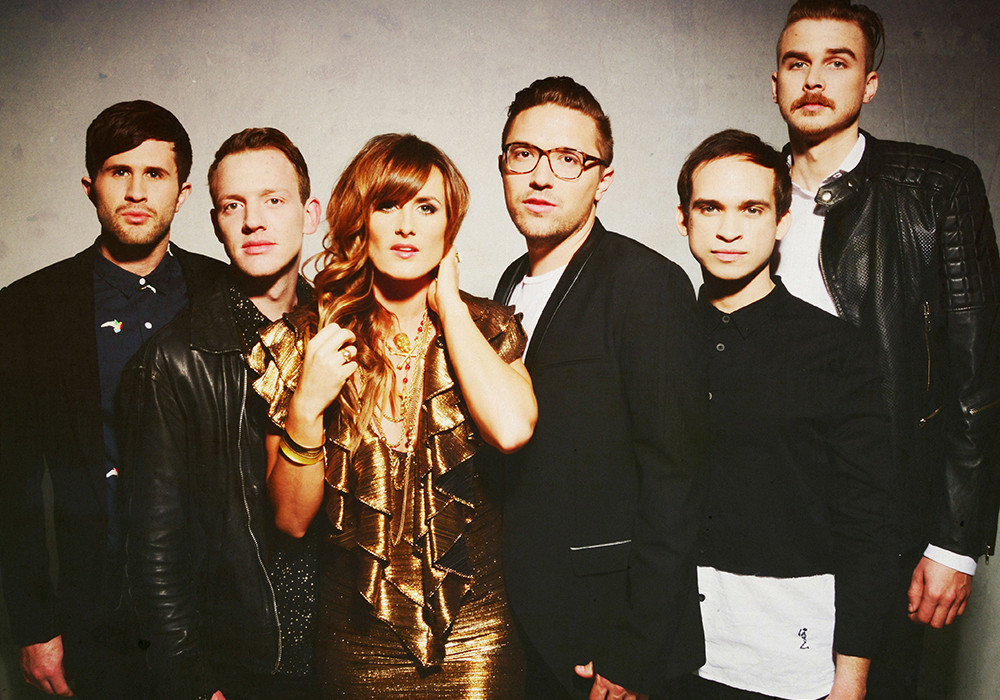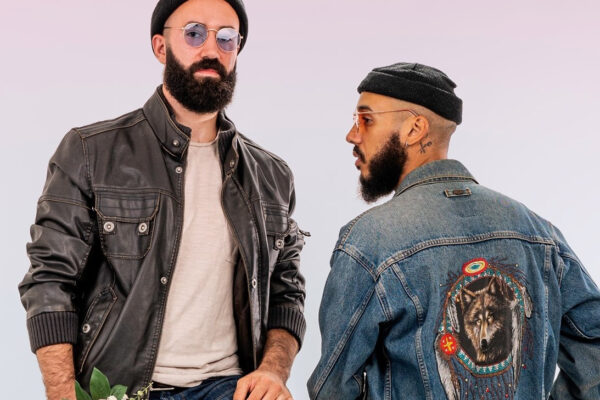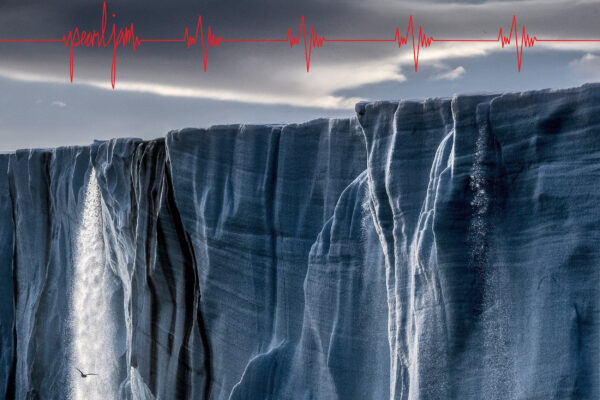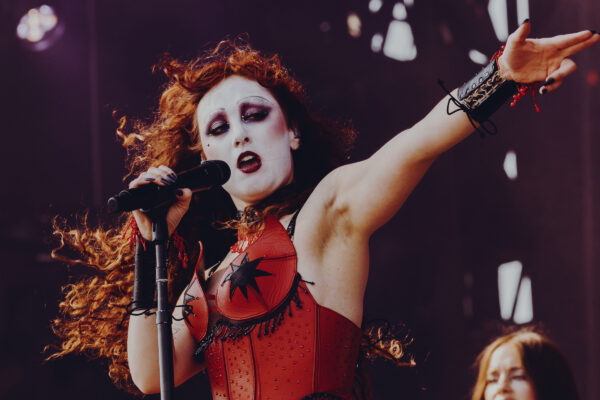“I remember when “Heartbeat,” on the last album started to climb the charts on radio and people started knowing it when they would come to our shows. There was this weird, amazing energy. We would start playing and people would cheer and start dancing around, and I was like “What the heck?” You’re like, ‘I wrote this song in my bedroom, how do you know it?’ It’s crazy.”
Soon after meeting at Nashville’s Belmont University in 2007, keyboardist Kelsey Kopecky and guitarist Gabe Simon embarked on a project that would take them far from the college halls they once roamed together. Along with bassist Corey Oxendine, drummer David Krohn, guitarist Steven Holmes and cellist Markus Midkiff, they went on to instill a sense of themselves in the music they were creating, comfortably unearthing fragments of the family bond they found in one another. Writing and recording under the name Kopecky Family Band, they released their full-length debut, Kids Raising Kids in October of 2012. Signed to ATO Records the following year, the album was re-released to widespread praise and recognition. And although they shortened their name to Kopecky in December of 2014, the familial, collaborative spirit they have long cultivated still follows them wherever they go. Speaking to Pancakes and Whiskey a month before the release of their second record, Drug For The Modern Age, founding member Kelsey Kopecky spoke fondly about the group’s formation, recording the new album and how her musical roots lead her to Nashville.
Soon after receiving a Jefferson Airplane album from her Grandmother’s vinyl record collection, Kelsey Kopecky was struck by the spirit of bandleader Grace Slick, stating “She had a huge voice, a huge presence even in the midst of a band with a bunch of dudes. It was a cool album, too. It was very different then what I’d heard from the radio, and it kind of opened my eyes to music as more of an art form.” Acknowledging how hearing her Grandmother’s records contributed to her own musical education, Kopecky further discussed how time spent with her family organically lead to a burgeoning artistic nature and interest in music.
“It always felt like an experience, like an art experience, going to my Grandma’s house. So I would say that and then musically, just growing up always having music around. I spent a lot of time in my dad’s garage, roller-skating around while he was working on a car or something. And I remember listening to Springsteen and Steve Miller Band and other classic rock. So I had a lot of different music coming at me all the time. It was awesome. And my mom would clean the house on Saturday mornings to Michael Bolton blaring” (laughs).
In addition to inheriting her interest in the art world, Kopecky spoke about sharing a deep sense of spiritualism with her Grandmother. Examining that wider influence, the musician talked about how feeling a strong connection to her surroundings greatly enhanced her experiences with songwriting, explaining how it’s a “spirituality that she’s passed down to my mom and to our family as a whole.”
“I’ve felt the most close to God when I’m in that very vulnerable situation, like writing a song with another person or by myself. When you’re sitting there at the piano and you’re totally still and just like listening and connected and not judging what ideas you’re having that are just coming up.” Although she does admit that composing personal songs inspired by her own life experience can be difficult to take out on the road. Reflecting on the Kids Raising Kids track, “Change,” Kopecky described it as, “this really slow ballad, really airy and spacey and I’m basically telling the story of love and love lost through verse.”
“I remember when we were first playing that song, “Change,” it was really difficult because of the nature…The first verse is talking about love through the lens of my mother, the second verse through the lens of my father, like his regrets about getting divorced from my mom and stories he’s told me. And then the third verse is about my sister and how she’s happily married and she’s had children. And all of this is good, like she got butterflies when she met my brother-in-law and all this positivity around marriage. But also just knowing marriage, I shouldn’t even say marriage, but love, partnership with whoever is so scary because it’s reckless trust with another human. Like, ‘Ok, I can only bring my fifty percent and I have to trust you that you’ll meet me halfway.’ And so when you realize that like, ‘Hey, my life could take a drastic turn if you change.’ That has always scared me.” And while sharing her personal recollections with a live audience can sometimes be intimidating, for Kopecky it’s become a crucial part of establishing a connection between the band and their followers.
“Playing music on stage is the most scary thing, but also the most amazing thing. Because when you share the deepest truth and deepest detailed story that allows someone else to not feel alone in their story, I mean, I’ve just seen the coolest things…Like having fans that turn into friends come up and they’re like ‘Hey, I got through this really hard time and I just wanted you to know that I listened to ‘Change,’ and that really helped me.’ And I was like, ‘Wow, for us to be able to be the soundtrack to people’s human experience is really huge and it’s an honor.’”
Reflecting on Kids Raising Kids and the soon-to-be-released Drug For The Modern Age, Kopecky explained how many of the tracks recall the band’s own memories of touring. Regularly replacing the technicalities of a pre-show sound check with the creativity and enthusiasm of a writing session, the band often finds themselves working on new material while out on the road. Describing how they wrote “The Glow,” while traveling from St. Louis to Nashville in their van, she went on to say how, “this new song, “Vancouver” that’s on the new album that will be coming out, we actually started in a Vancouver sound check. We just never had the heart to change the name,” before adding that, “it has nothing to do with Vancouver.” And while touring often takes them far from home, Nashville has been a strong source of inspiration ever since Kopecky moved there to attend college.
“Me and my mom flew down for a tour of the school and campus and instantly I was like, ‘This is where I need to be.’ It was warmer than Minnesota where I’d grown up and the campus felt really inspiring and buzzing from all the musicians. And Nashville itself has, even in the ten years I’ve lived here, transitioned so much from just country music to really awesome garage rock and roll and punk music. And now the Black Keys and Dan Auerbach and Jack White and Third Man Records and all of these really cool rock and roll and pop people have come out of and are calling Nashville home.” The rich history of Tennessee’s capital city has continued to thrill the songwriter, providing the key inspiration behind a newer, treasured song about her former home.
“I love writing super emotional, poetic ballads about experience. That is just what really speaks to me and is something that right now is really flowing freely. And I wrote this song called “1920,” and it was about the house I basically lived in for seven years here in Nashville. We ended up going with this song called “Closed Doors,” for the ballad of the album, which was the right choice. I definitely wanted that song on the album. But this song “1920…” I feel like it was the last song I wrote in the house before it actually got bulldozed and they put up some dumb condos in its place. And it was just this song, like writing to the house as if it were like the source of creativity and being like, ‘I’m afraid that if I move from here I won’t be able to write.’ It was like this confession. But anyway, I love it and I know it will come out eventually on a B-side, and we definitely have a handful of like five or six songs we all still love and still play live sometimes. We’ll be like ‘Oh, let’s play this one,’ just because we love playing it.”
Acknowledging the difficulty of choosing which of the group’s thirty-plus song demos would be re-recorded and included on the new album, she explained how it’s inevitable that songs like “1920” are left to find their place on future projects. Speaking candidly about the joy that accompanies those complications, Kopecky said “the beauty is that this record is a representation of all of us, which is great.” Eager to share the inspirations and motivations behind the upcoming album, she also talked about some of the newer tracks that fans can look forward to hearing very soon.
“There’s a song called “Thrill,” that’s all about just being addicted to the temptation of something new, like being unfaithful to your husband or me being the safety net of something for what you think will be more fun or exciting and how that usually doesn’t pan out. Or there’s a song called “Burnin’” that’s all about being addicted to alcohol or a substance or gambling or whatever it is, and how that pull is like this really sensual whisper in your ear that’s so personal and it’s hard to explain to other people because it’s in your psyche, this addiction or whatever.” Although it is the album’s closing song and namesake that provides the most insight into the band’s latest project.
“The last line in “Drug For the Modern Age” is “There’s a season when we’re all going to die.” And that’s the last line. Gabe actually wrote like that concept of ‘Oh, you’re the drug for the modern age,’ and I was like, ‘What does that mean?’ I ended up helping him finish it and wrote some verses with our guitarist, Steven. And he’s like, ‘I don’t know, I was just trying to say in the most ridiculous way like how to love someone.’ And I was like, ‘Oh my gosh, like you’re the drug for the modern age, you could cure all the disease in the world’ type of thing, you know? And it’s such an extreme statement but because of that song, we really realized like ‘Wow, other songs on our album have this similar theme in it.’
Drug For The Modern Age Available In-Stores and Online on May 19th
Don’t Miss Kopecky At Mercury Lounge on 5/4 and Baby’s All Right on 5/5
Article: Caitlin Phillips




